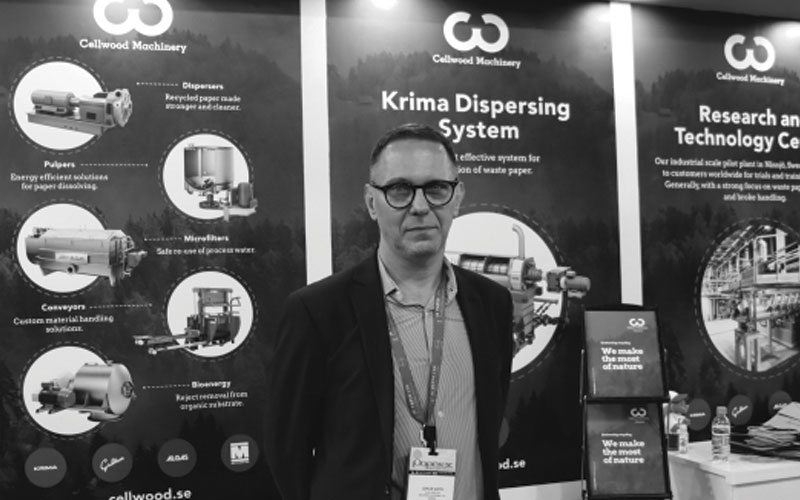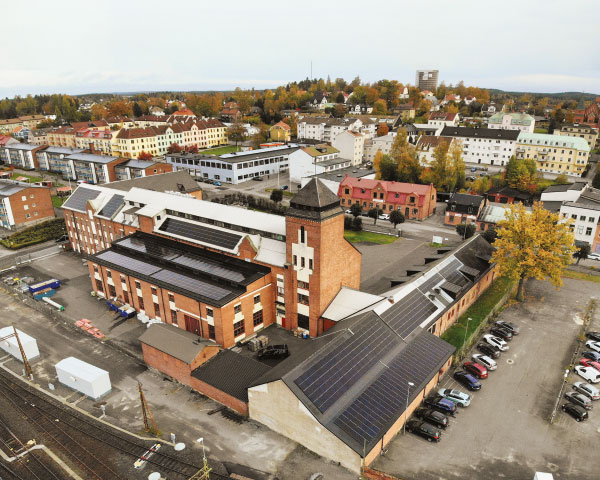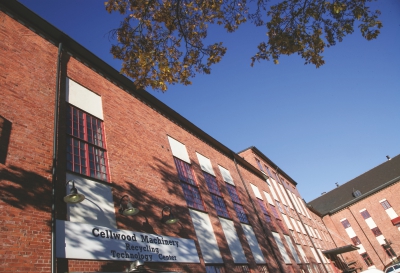The globally recognized name in dispersion of waste paper, Cellwood, continues with its sustainability measures for a cleaner and greener future. The supplier recently shared information about its unique system, which saves energy and decreases raw material sourcing costs during production of paper. This was revealed by Mr. Johan Goth, Sales & Marketing Director, Cellwood Machinery AB, while having a conversation with Paper Mart during Paperex 2023.

Paper Mart: Cellwood has become one of the leading brands in dispersion of waste paper and other fibers. Please share some inputs on how it all started?
Johan Goth: Cellwood is a privately-owned company, which is now in its third generation. The company specializes in highly-efficient systems for dissolving and dispersion of large volumes of recycled paper and other fibers. The Stenberg family started Cellwood in Sweden in 1913 with the production of a hot bulb engine, a type of engine which can basically run on any type of fuel. It continued up to the mid 1950s. Cellwood then started developing a wood chip refiner, commonly known as the pulp mills. After recognizing the demand for treatment of recycled fiber, we converted this refiner to a hot processing system and since 1973, we have been supplying this type of system throughout the world. First such system was supplied to India in 1983, 40 years ago. We are a rather small player if you compare us with other companies. We are very proud of supplying a key component in stock preparations as a specialist. We are not full line suppliers but still survive year after year by supplying this key component. That’s why we consider ourselves a very important part of this industry.
PM: How do you help customers produce better quality paper?
JG: We help them by supplying this unique type of system, wherein they can use low grade waste paper and still produce a very strong and clean final product. We help them to save energy and raw material sourcing costs as they can source cheaper raw material, and still remain competitive in the market.
Watch: Starkraft to Offer Capacity of 350,000 tons from May 2024
PM: You mentioned the use of green technology by Cellwood to increase energy efficiency. Kindly elaborate in detail.
JG: There are many technologies which are used to remove impurities during the process of paper making. One of them is called screening. Normally, when screening is used to remove impurities, it leads to loss of a good amount of fiber. We do not have any rejects in our system. We treat it as it is. It increases the amount of fibers and cuts off refining energy. Since it is a high consistency refiner, you also gain strength.

PM: R&D is crucial for any business, any manufacturing industry and that too a capital equipment and technology-oriented industry. Elaborate on R&D efforts put in by your company.
JG: We have installed our pilot plant in Sweden, which is a small stock preparation plant that customers can use to try to develop their own product. But of course, we also use it for developing our own products. Our current focus, as I said before, is on energy consumption, steam consumption, and a different type of disk pattern to improve the quality even further. It’s an ongoing process. Many times, we do it together with some key clients to try to develop something better. As you mentioned, this is crucial for everyone.
PM: Tell us a bit about the mission of the company and its values.
JG: Cellwood values long-term relations with clients. It also contributes to the society by paying taxes and giving good benefits to the employees. At the same time, sustainability and an environmental profile is also very important for us.
PM: Please give information about the market where your products find application and your key clientele.
JG: In India, we have installed around 90 systems. Our key clients include Satia Industries, Ballarpur Industries, ITC Limited, Silverton Pulp & Papers Private Limited, Shri Hari Krishna Papers Private Limited and GVG Paper Mills Private Limited.
Also Read: Runtech Systems: Global Leader in Paper & Pulp Machine Optimization
PM: Your views on the Indian market and how you look forward? What kind of commitment Cellwood has for this market?

JG: We’ve been here for 40 years and intend to stay at least for another 40 years. Not only for India, but in general, we all are fighting with challenges like electricity consumption, steam consumption and water consumption. If we can overcome these issues and improve ourselves, I think the paper industry has a very bright future because e-commerce is booming. Another highlight is removal of plastic and similar materials from modern products and substituting it with environment-friendly options such as fiber. If we can overcome the energy issues and technical malfunctions, then we have a really bright future for the fiber, which is a very good raw material for packaging and for replacing plastic.
PM: Another important aspect for the pulp and paper industry is customer service and support. Tell us your approach about the same and how do you go about customer satisfaction?

JG: We consider our customers as marketing opportunities. It is very important for us to make good delivery for each customer and also have a room for planning. We don’t have a huge organization for service. We are represented almost everywhere in the world. The key success factor is supplying high quality equipment from the beginning. We don’t have to do a regular service but of course if we have to in some cases, we provide it.
In India, we had deployed service engineers in our local plant in India, around three years back.
Internet-based solutions are providing online services much better than before.
PM: Can we expect some major technology breakthrough from Cellwood in future?
JG: I would not say a major breakthrough. We are a specialized small player, but we try to adapt to any breakthrough by constantly improving ourselves. We are involved in several projects in Sweden, but cannot reveal much at this stage. They are non-disclosure agreements but mostly, they are about replacing other fibers with pulp fiber.



